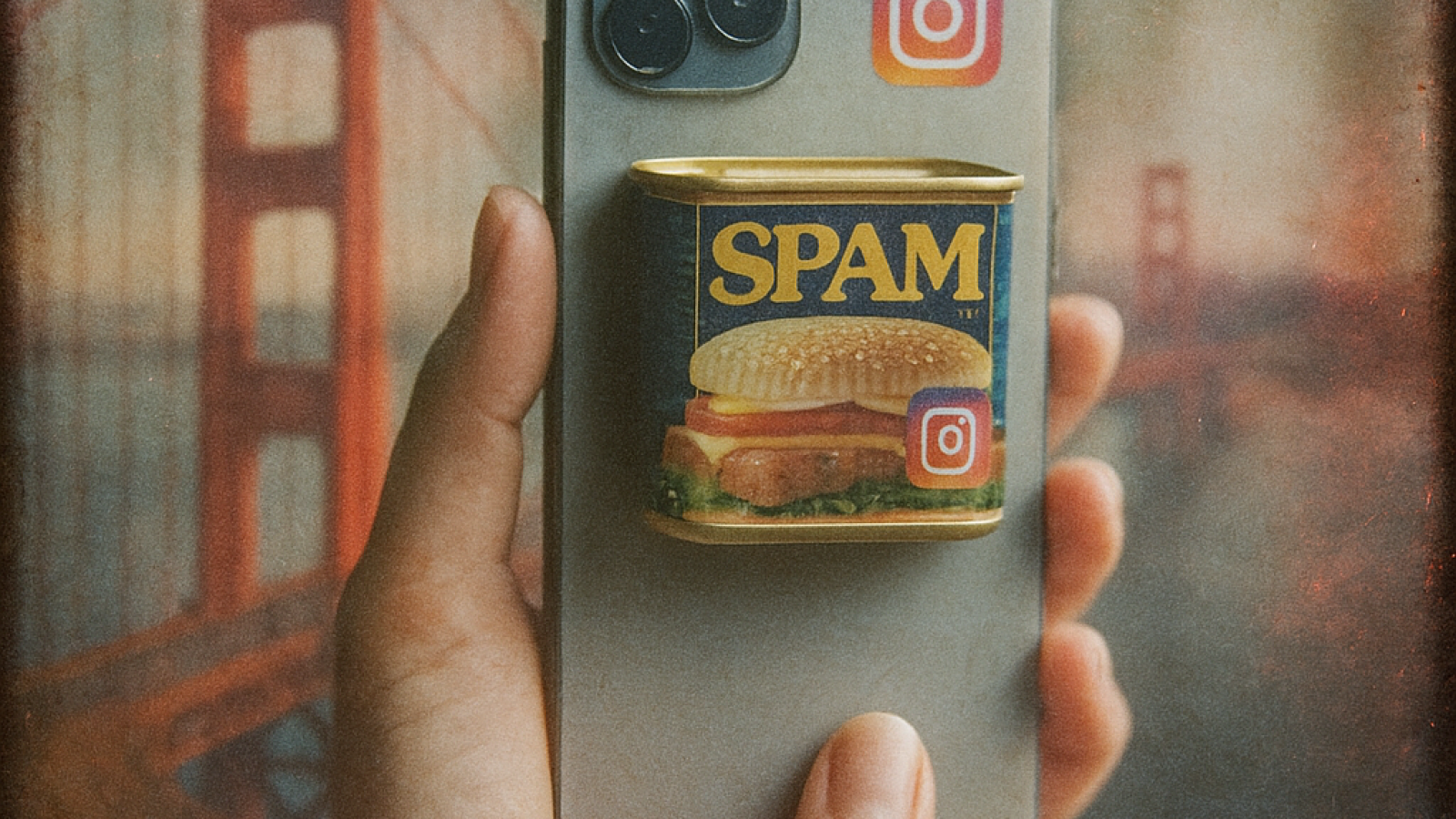Instagram Cracked the Spam Problem. Here's What It Means for AI Search

Last April, Mark Zuckerberg testified under oath during the FTC's antitrust trial against Meta. Kyle Chayka, writing in The New Yorker, reported that over ten hours of testimony, Zuckerberg described his company as now being involved in "the general idea of entertainment and learning about the world and discovering what's going on." Not connection. Not friends. Discovery.
Meta's own internal data, shown during the trial, revealed that friend content had dropped to just seven percent of time spent on Instagram. The rest is algorithm-fed discovery and search results, basically, ranked by an AI system deciding what deserves attention.
Instagram isn't social media anymore. It's a search engine.
There was this beauty brand I kept seeing everywhere for a while, one of those accounts with hundreds of thousands of followers built entirely on reposting other people's makeup videos. You know the type. They'd find something trending, download it, slap their logo in the corner, post it with some generic caption about self-care or confidence or whatever the algorithm was rewarding that week. And it worked. For years, it just worked.
Then in April 2024, their Explore page reach went flat. Just stopped. And around the same time, this smaller account started making these simple "Get Ready With Me" videos. Nothing fancy. Just someone talking to their phone camera while doing their makeup, the kind of thing that feels almost too ordinary to be content. Their reach went up 500%.
I've been thinking about this a lot because the same pattern is happening with AI search, or it's about to happen, or maybe it's already happening and we just haven't noticed yet. Instagram spent over a decade building a system that accidentally rewarded people for stealing other people's work, and then one day they just changed it. They fixed it. And the fix worked, which is the interesting part, because it means the problem was always solvable, they just had to decide to solve it.
The thing about aggregators
Instagram's aggregator problem was basically this: if you could make good content, great, but if you could just repost someone else's good content, you'd probably get the same reach for way less effort. The economics were broken. Creating something original costs time and money and skill. Finding something popular and reposting it costs nothing. And for the longest time, Instagram's algorithm treated both the same way, or actually treated the repost better sometimes because the aggregator accounts knew how to optimize for engagement in ways that regular creators didn't.
So you had this whole ecosystem of accounts that existed purely to copy other people's work. And the people making the actual videos would watch their content get more views on someone else's page than on their own. The system was supposed to reward creation but it had accidentally built itself to reward theft, or at least very efficient content arbitrage.
I started doing SEO in 2004. Sacramento. A business park near the American River, sycamores outside, triple-digit heat that made showing up to the interview in a tank top seem like a reasonable decision. They hired me anyway. The job was supposed to be writing, but it wasn't really writing, it was making Google think a skincare company was trustworthy enough to rank when someone typed "Strivectin" or "Vitamin-C Serum" or whatever peptide was trending in women's magazines that week. We'd build links, optimize keywords, play all the technical games that made the algorithm pay attention. And it worked. We dominated that space. My boss had a PhD in physics and treated SEO like rocket science.
But the whole thing felt off from the start, like we were dressing up real expertise in link-building schemes just to make Google notice it. You could be genuinely good at what you did, actually understand skin or software or addiction recovery, and still be completely invisible online if you didn't know how to game the signals. I watched it happen over and over. Software companies that built world-class tools losing traffic to content farms that had never built anything. Real addiction counselors who'd been in recovery themselves getting outranked by lead-gen operations that just harvested desperate people's information and auctioned it off to corporate treatment centers. Massage therapists getting buried beneath affiliate sites selling healing crystals for back pain because the crystal sites knew how to optimize and the therapists didn't.
And we all just swallowed it. Adjusted to it. Built careers around it. Spent two decades helping real experts stay visible in a system that was fundamentally designed to reward the wrong people. I wrote about this back in June, about how the internet had spent decades giving credit to the loudest and trickiest instead of the people who actually knew what they were talking about, and why I was starting to notice that AI search might be different, might actually care about expertise instead of just optimization.
Because here's what Instagram just proved. You can fix this. The problem isn't inevitable.
And this is exactly what's happening with AI search right now, or what's about to happen, or what's been happening quietly while we were all paying attention to other things. Content farms can generate hundreds of articles per day using language models. Each article optimized for the exact questions people type into ChatGPT or Perplexity or whatever. Each one costs almost nothing to produce. Meanwhile, actual reporting, the kind where someone spends months investigating something and talking to sources and checking facts, that costs everything.
When you ask an AI a question, it doesn't really distinguish between a journalist who spent three months on a story and a content farm that spent three minutes rephrasing that journalist's work. Both get treated as sources. Both show up in the training data. Both get cited. The economics are broken in the same way Instagram's were broken, just on a different platform with different specifics but the same underlying problem.
What Instagram actually did about it
In April 2024, Instagram announced this new ranking system, and the details matter here because they show what's actually possible when a platform decides it cares more about originality than about pure engagement metrics.
First, they built detection. When their system sees duplicate content, it traces it back to whoever posted it first. The repost gets replaced in recommendations. Not deprioritized, replaced. The original shows up in Explore and Reels and the feed suggestions. The copy doesn't. And they tell the original creator when this happens, which seems like a small thing but it's actually kind of significant because it makes the system visible in a way that algorithms usually aren't.
Second, they made the penalties mean something. If you post ten or more pieces of unoriginal content in thirty days, you become ineligible for recommendations. Which on Instagram means you basically don't exist beyond your existing followers. No discovery. No growth. No reaching new people. The recommendation engine is the distribution mechanism on that platform, and they just cut you off from it entirely.
Third, and this is where it gets interesting, they didn't kill derivative culture. Memes still work. Parodies work. Reaction videos work. Duets work. The distinction they made was around something they call "material enhancement," which is a corporate way of saying you can build on someone else's content if you actually transform it into something new. Direct replication dies. Creative reinterpretation lives. They're trying to preserve remix culture while killing content theft, which is a harder line to draw than it sounds.
And then you could see it in the numbers. Original creators saw their organic reach go up an average of 27%. Aggregator pages saw what the reports called "a sharp drop," which is corporate speak for their reach collapsed. Some accounts that had built entire businesses on reposting just went dark. Stopped posting. The business model didn't work anymore.
Navigating the shift from traditional search to AI-mediated discovery? I help businesses adapt their content strategy for the evolving search landscape:
Why this should be easier for AI search, not harder
The obvious response is that Instagram is a closed platform with user accounts and timestamps and a clear record of who uploaded what when. The web is this open, chaotic thing where attribution is messy and detection is hard and everything is more complicated.
Except I think AI companies might actually have an easier job than Instagram did, at least technically. They can analyze writing patterns. They can spot AI-generated text pretty reliably now. They can see which content appeared first chronologically. They have access to the entire crawl history of the web. They control the ranking entirely. They don't have to remove anything from the internet, they just have to decide what gets surfaced when someone asks a question.
Instagram's "material enhancement" test is actually a good model here. They're not matching content byte-for-byte. They're evaluating transformation. Did this person add something new. Did they change the context. Did they build on the original in a way that matters. That's a judgment call, but it's a judgment call that AI systems are arguably better equipped to make than human moderators were.
When ChatGPT decides to cite a primary source instead of a summary article, it's already making this kind of judgment. When Google deprioritizes obvious scraper sites, it's already making this kind of judgment. The infrastructure exists. The capability exists. The question is just whether the incentive exists.
Instagram took thirteen years to prioritize originality. They had to get to a point where the aggregator problem was actually threatening the core product. Where creators were leaving because their work kept getting stolen. Where users were noticing that everything looked the same. Where the growth metrics started to suffer because the content quality was declining.
AI search is maybe three years old, depending on how you count. It hasn't hit that breaking point yet. But you can see the early signs if you're looking for them.
What's already happening, sort of
Google's been doing these "helpful content" updates since 2022. The language is always vague and corporate, something about "rewarding people-first content," but the mechanism is the same as Instagram's. Deprioritize sites that exist to game search rankings. Prioritize sites that exist to actually inform people. It's early and imperfect but it's the same basic idea.
Perplexity shows its sources. ChatGPT shows its sources. Both platforms seem to understand that credibility requires attribution, that when someone asks a question they want to know where the answer came from, not just get an answer. That creates pressure toward original sources rather than repackaged versions of original sources.
And the arms race is already underway. SEO farms are adapting the way Instagram aggregators did. Adding long unrelated captions to make reposts look original. Using AI to rephrase content just enough that it passes duplication checks. There was this study that found meme accounts on Instagram adding meaningless technical captions to their posts saw a 30% increase in reach because the algorithm thought they were creating educational content.
It's the same pattern every time. Platform launches. Growth happens. People figure out how to game it. Gaming gets sophisticated. Platform has to decide whether to let it continue or fix it. Instagram fixed it. We have proof that fixing it is possible, that the methods work, that original creators can win if the platform decides to make them win.

What this means if you're making things
If you create original content, if you do actual reporting or analysis or research or anything that requires expertise and time, the incentive structure is starting to shift. Maybe slowly, but it's moving.
Being first matters again. Being the source matters. Having depth matters. Having a perspective matters. All the things that make content expensive and difficult to produce are becoming the things that make it valuable and discoverable.
If you're running a content arbitrage operation, if your business is built on repackaging other people's work at scale, Instagram's timeline suggests you have less time than you think. Maybe a couple years. Maybe less. The bar is getting set at "material enhancement," at adding something genuinely new, and that's a harder bar to clear than it sounds when you're optimizing for volume.
The shift won't be announced. There won't be a press release that says "we're now deprioritizing all repackaged content." It'll just happen gradually, the way it happened on Instagram, where one day the aggregator accounts noticed their reach was declining and by the time they figured out why, the business model was already dead.
The pattern here
This isn't really about Instagram or AI search specifically. It's about what happens to every information system once it gets big enough. Growth creates abundance. Abundance creates noise. Noise creates optimization. Optimization creates gaming. Gaming creates a system where copying beats creating because copying is cheaper and faster and the algorithm can't tell the difference.
And then the platform hits a decision point. Let it collapse under its own weight, or rebuild the incentive structure to reward originality. Instagram took thirteen years to make that choice. AI search is moving faster, the competition is more intense, the infrastructure is more sophisticated, the pressure to differentiate is stronger.
I spent two decades watching the loudest and trickiest win. Google rewarded reputation over substance. Publishers built careers paraphrasing other people's work. We all got good at gaming whichever system we were working in.
But AI systems don't seem to care about the same signals. They don't get impressed by backlinks or domain authority or how many times Forbes mentioned you. When I ask ChatGPT or Perplexity something now, they cite the actual documentation, the primary research, the company that built the thing instead of the blog that summarized it. It's not perfect and it's probably not permanent, but for right now, expertise is starting to matter more than optimization.
Instagram took thirteen years to decide original creators mattered more than engagement metrics. AI search has been around for maybe three. It could absolutely create new gatekeepers, new optimization games, a fresh generation of people who figure out how to game the machine and steal credit all over again.
But if it can shift things even slightly, if it can reward the people actually making things instead of the people who got good at repackaging what other people made, then maybe we end up with something a little less broken. Not perfect. Not utopia. Just a system that occasionally gives credit to the right people instead of the loudest ones.
That would be enough.


Member discussion